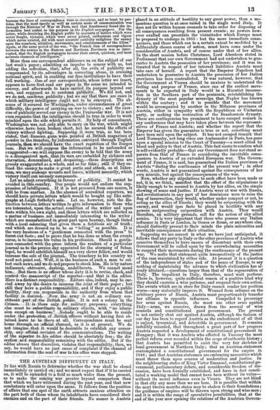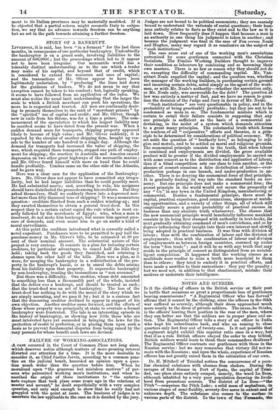THE AUSTRIAN DIFFICULTY IN ITALY.
Jr lies with Russia to determine whether the war shall be closed immediately or carried on; and we must expect that if it be carried on, it will be extended to a field so much wider than the present, as to make the coming war greater beyond comparison than that which we have witnessed during the past year, and that new combatants will enter upon the scene. It follows from the position of affairs that one spot of the earth attracts anxious attention on the part both of those whom its inhabitants have considered their enemies and on the part of their friends. No sooner is Austria placed in an attitude of hostility to any great power, than a mo- mentous question is at once raised in the single word Italy. It does not lie within human counsels to take order for disposing of all consequences resulting from present events ; no powers how- ever exalted can preordain the vicissitudes which Europe must be prepared to undergo in 1855 : but the more immediate conse- quences, and those which can to a certain extent be modified by a deliberately chosen course of action, must have come under the consideration of Austria, and of course under that of her allies. In the short session before Christmas, Lord Aberdeen stated in Parliament that our own Government had not undertaken to gua- rantee to Austria the possession of her provinces; and it was in- timated that in respect of her internal liabilities Austria must take care of herself. A report that the Emperor Napoleon had undertaken to guarantee to Austria the possession of her Italian provinces has been contradicted. It was natural, however, that the Government at Vienna should be anxious to understand the feeling and purpose of France, since one of the earliest move- ments to be expected in Italy would be a Muratist insurrec- tion in the Southern part of the peninsula, reestablishing the dynasty of the most popular sovereign that Naples has known within the century ; and it is possible that the movement would be accompanied by another in the Milanese provinces of Austria, either in sympathy with the Republican or Unitarian party, or seeking the restoration of the Beauharnois dynasty. These are contingencies too prominent to have escaped remark in any conferences that may have taken place between the represent- atives of France and Austria ; and whether the report that the Emperor has given the guarantee is true or not, something must have been said upon the subject. It has not escaped remark that Lord Normanby, not long since our Ambassador in Paris, has gone upon a special mission to the Court of Tuscany—a court allied by blood and policy to that of Austria. This fact seems to confirm what is self-evidently probable—that our Government does not stand se- parate from that of France in considering the inevitable conse- quences to Austria of an extended European war. The Govern- ment of France, it is said, has guaranteed the Italian provinces of Austria "during the continuance of the present war"; in other words, Austria is not guaranteed against the consequences of her own misrule, but against the consequences of the war. Now, whether any stipulations to such effect have been made or not, it is, we think, manifest that the effect of the stipulations is likely enough to be secured to Austria by her allies, on the simple showing of sense and justice. If Austria were at war with Russia, and revolutionists in any part of her dominions were to raise the flag of insurrection, they would, whether under compact or not, be acting as the allies of Russia ; they would be cooperating with the enemy, and would ipso facto be placed in hostility with any powers reciprocating cooperation with Austria. They would therefore, on military grounds, call for the action of any allied armies. It is very important that those who possess any Italian influence in Paris or London, in Genoa or Rome, or anywhere else, should distinctly present to their minds the plain necessities and inevitable consequences of their situation. Supposing we are correct in what we have just anticipated, it follows that any party in Italy or the other provinces of Austria who conceive themselves to have causes of discontent with their own Government will be called upon by the overwhelming necessities to suspend their movements during the continuance of the present war. We make that statement quite irrespectively of the justice of the case maintained by either side. At present it is a question of the independence of states and of the peace of Europe, to say nothing of maintaining the advance to which civilization has al- ready attained,—questions larger than that of the regeneration of Italy. The impatient in Italy, therefore, must wait perforce. There is, however, quite sufficient reason of a positive kind why they should exercise a wise patience, and suspend their own action. The events which are in store for Italy cannot render her position worse—may materially improve it. Weaned from reliance on the arbitrary power of Russia, Austria must proportionately transfer her alliance to opposite influences. Compelled to preoccupy her arms against Russia, she must use other arms against Italy—arms, we conceive, drawn from the arsenal of wise councils and constitutional good government. The ground is not entirely shut out against Austria, although the fashion of our day has been to regard Austria as the embodiment of all that is unjust, tyrannical, and detestable in government. It remains indelibly recorded, that throughout a great part of her progress Austria respected a development of constitutional government in Hungary ; that it was Austria who effected in Tuscany the most perfect reform ever recorded within the scope of authentic histoity; that Austria has permitted to exist the very fair skeleton of local government in Northern Italy ; that an Austrian statesman contemplated a constitutional government for the empire in
1848; and that Austrian statesmen are embracing necessities which must throw them upon courses of moderation and justice. In the neighbouring states of Kin°. Victor Emanuel, constitutional go- vernment, parliamentary debate, and considerable freedom of dis- cussion, have been formally established, and have in fact consti- tuted a working model that cannot have been without its value—
without its moral influence even in Vienna. They are not blind in that city any more than we are here. It is possible that within the next twelve months states may be shaken to their foundations; the guidance of empires will be thrown upon strong and wise men ; and it is within the range of speculative possibilities, that at the end of the year now opening the relations of the Austrian Govern.- ment to its Italian provinces may be materially modified. If it be objected that a partial reform might reconcile Italy to subjec- tion, we say that no advance towards freedom can be -anything but an act in the path towards attaining a further freedom.







































 Previous page
Previous page